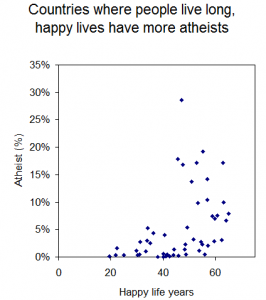The splendid World Happiness Database has released a new analysis of their 2009 data. Basically what they’ve done is to multiply happiness scores in each nation with the life expectancy. The idea is that what most people want is a life that’s both long and happy.
Costa Rica came out top, followed by the usual gaggle of Northern European Countries (and Canada).
Now, there’s an ‘ecological’ problem in this analysis, in that the people with long lives in a nation aren’t necessarily the happiest. What’s more, happiness might be very unevenly distributed in some countries.
And being grumpy might have its plus side – in the news yesterday was an Australian study which claimed that grumpy people are less prone to errors of judgement!
 Be that as it may, whenever these national statistics come out I always like to correlate them against religion, to see how they stack up. So here’s the results for this one.
Be that as it may, whenever these national statistics come out I always like to correlate them against religion, to see how they stack up. So here’s the results for this one.
What I’ve done is plot the percentage of hard-core non-believers in each country against the ‘happy-life-years’.
In the top graph, it’s the percentage of people who say they are ‘confirmed atheists’. In the bottom graph, it’s the people who say that religion is ‘not at all important’ to them.
There is a weak, but statistically significant relationship – especially with the unimportance of religion. What’s more, the correlation is about 50% stronger than with happiness alone.
However, digging around in the data shows that the is mostly driven by life expectancy. Average happiness, by itself, is not related to the number of atheists, and only marginally related to the number of non-religious.
Now the interesting thing is that happiness is strongly correlated with life expectancy (as you might expect). So you also would expect a correlation of happiness with atheism – simply because they both correlate with life expectancy.
The fact that this does not happen suggests a negative interaction. What may be happening is that some countries with short life expectancy are particularly religious. That makes them happier than you would expect, and confounds the straightforward link between long life expectancy, happiness and atheism.
To put it another way, turning to religion has the effect of increasing happiness. But good life expectancy is more important, and countries with good life expectancy are the happiest and least religious.
__________________________________________________________________________
 This article by Tom Rees was first published on Epiphenom. It is licensed under Creative Commons.
This article by Tom Rees was first published on Epiphenom. It is licensed under Creative Commons.














